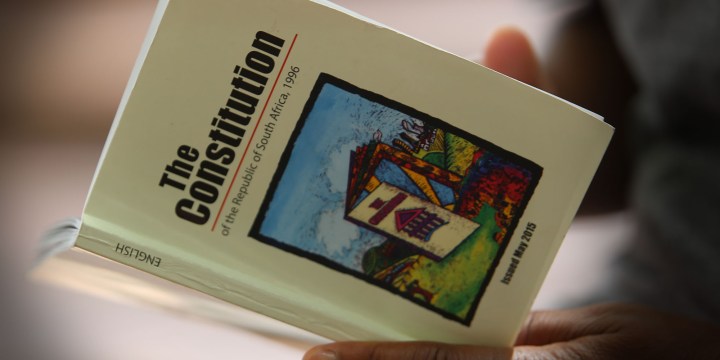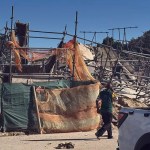OP-ED
Sakhisizwe Municipality and the failures of local government

It is 25 years into South Africa’s democracy and significant challenges remain. While the political spotlight is on the performance of President Cyril Ramaphosa and the ongoing State Capture inquiry, local government continues to be a serious cause for concern — with about 30% of municipalities characterised as dysfunctional by the Department of Co-operative Governance and Traditional Affairs.
The ongoing situation at Sakhisizwe Municipality in the Eastern Cape is an indictment of the growing malaise affecting municipalities. Despite a progressive legal framework, financial mismanagement, a lack of human resources and poor service delivery combine to give people no choice but to protest.
An even greater concern is a lack of accountability for those responsible. What choice do people have in this case and what can be done to enhance democratic structures responsible for local government?
According to Professor Lungisile Ntsebeza and Dr Fani Ncapayi from the Centre for African Studies at the University of Cape Town, 87 out of the 283 municipalities in the country were characterised as dysfunctional by former Minister of Co-operative Governance and Traditional Affairs Zweli Mhkize.
The reasons provided by Mhkize include “mismanagement, political instability or interference, corruption and incompetence as contributory factors to the challenges facing municipalities”.
According to the same report, 45 municipalities regressed in audit outcomes while only 33 municipalities were able to produce quality financial statements and performance reports which complied with legislation.1
The legal framework for local government is structured in terms of Chapter 7 of the Constitution. According to section 152 (1) of the Constitution, the objects of local government are:
-
To provide democratic and accountable government for local communities:
-
To ensure the provision of services to communities in a suitable manner;
-
To promote social and economic development;
-
To promote a safe and healthy environment; and
-
To encourage the involvement of communities and community organisations in matters of local government.
Additionally, the Municipal Services Act provides for the establishment of mechanisms and processes to promote the economic and social development of local communities.
The legal framework above envisages that local government be democratic, accountable and progressive in promoting social and economic development. However, when municipalities are dysfunctional it creates an untenable situation.
It is by no surprise, then, that the popular response to dysfunctional municipalities comes in the form of protests. Take the example of the protests in the Alexandra township over the past few weeks, which has resulted in hearings convened by the Human Rights Commission and the Public Protector. Municipal IQ has further noted that there has been an increase in violence during service delivery protests.
The example of Sakhisizwe Municipality suggests there are myriad factors to address when dealing with dysfunctional municipalities. A greater concern perhaps is the lack of a response by individuals responsible for the management of municipalities.
Sakhisizwe Municipality is located in the Chris Hani District in the Eastern Cape. It is comprised of two towns, namely Cala and Elliot. For several years the municipality has been embroiled in numerous crises. In 2018 the Eastern Cape Legislature declared Sakhisizwe Municipality dysfunctional. There have been numerous municipal shutdowns since.
The first protest occurred on 13 July 2018 in Cala, which was led by members of the ANC Youth League. The reason for this initial shutdown was alleged corrupt and irregular employment procedures by management relating to the disbursement of tenders. Thereafter, protesters demanded that the municipal manager and mayor resign.
Additionally, protesters alleged that construction companies from outside the municipality were given preference for tenders. These protests were not just damaging to the municipality itself, but created rifts in the ANC Youth League. This resulted in clashes between young people from Elliot on the one hand and Cala on the other.
Subsequently, the Provincial Executive Committee (PEC) of the ANC attempted to find a solution to this problem by suspending the mayor for three months pending an internal investigation into the matter. However, this exacerbated tensions in the Elliot community. Residents felt that they were marginalised from this decision and formed a crisis committee. They demanded that the mayor be reinstated.
One of the reasons for the creation of the crisis committee was that residents from Elliot felt that residents from Cala did not want a mayor from Elliot. The crisis committee argued that the internal investigation led by the PEC should look into the investigation of Sakhisizwe Municipality in 2009. This investigation was never made public and the crisis committee was angry because action was not immediately taken against the mayor (who was from Cala) at the time. The crisis committee contended that residents from Cala did not want a mayor from Elliot.
Consequently, residents from Elliot no longer want to be part of Sakhisizwe Municipality. The Elliot residents further cite a lack of service delivery (particularly the conditions of streets) in the town as a contributory factor.
It is very evident that crises at Sakhisizwe comprise multiple elements. One of the key concerns levelled at municipalities is the lack of finances. This was confirmed by the speaker of Sakhisizwe Municipality during the shutdown in September 2018. The funding received from national government through the Equitable Share Fund is not enough to save the municipality. Other key concerns include crime, lighting, unfinished infrastructure projects and a lack of enforcement and compliance with by-laws.
Calusa (Cala University Students Association) is an organisation that has been monitoring and attempting to aid the situation in the Sakhisizwe Municipality. Its director, Dr Ncayapi, who writes in co-ordination with several organisations such as the Cala Ratepayers Association, Elliot Residents Association, Siyazakha Land Rights Forum and the Mnxe Residents Association, has sent various letters to the municipality’s management (the speaker), the Public Protector and the Department of Co-operative Governance and Traditional Affairs.
The first letter, dated 9 November 2018, to the speaker of the municipality was to inquire into the state of governance at Sakhisizwe Municipality. Several documents were requested, such as the financial statements over the past five years and the land audit report.
The letter also requested answers to questions regarding the status of the chief financial officer and the suspensions of various managers at the municipality. Thereafter, a couple of follow-up letters were sent on 18 December 2018, 25 March 2019 (sent to the mayor) and 16 April 2-19. Unfortunately, no response has been received. In this period, a community dialogue involving various stakeholders took place in the Sakhisizwe Municipality regarding the shutdowns in 2018.
Subsequently, a formal complaint regarding the lack of response from the municipality was lodged with the Public Protector’s office. Last, a letter was sent to the Department of Co-operative Governance and Traditional Affairs lodging a formal complaint against the municipality. No action has taken place.
Despite the best intentions of members of the municipality as well as other stakeholders, nothing has been done about the situation at Sakhisizwe Municipality. Financial mismanagement, a lack of human resources and poor service delivery as well as an inability to hold those in management structures to account has led to a disastrous situation.
It is no surprise that in situations such as this, shutdowns and other forms of protest will occur. Finally, unfulfilled promises from political leaders and internal political party fights (as seen with the ANC Youth League in Sakhisizwe Municipality) will only compound the damage.
Calusa is now hoping that the newly appointed MEC for local government in the Eastern Cape will take steps to resolve the crisis, perhaps by taking the municipality into administration. DM
Haren Naicker, a UCT law graduate, is an intern with the Council for the Advancement of the South African Constitution (CASAC)
















